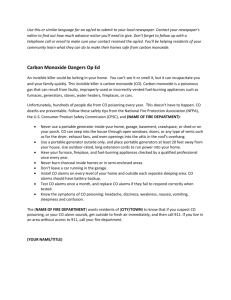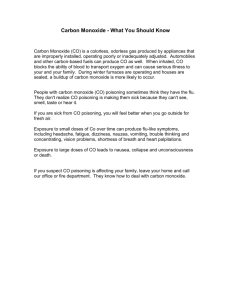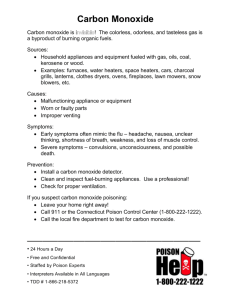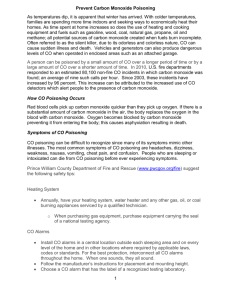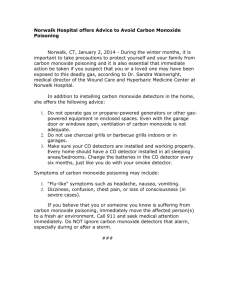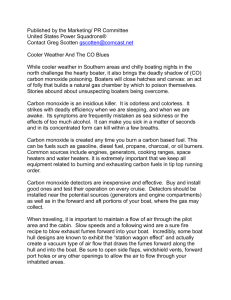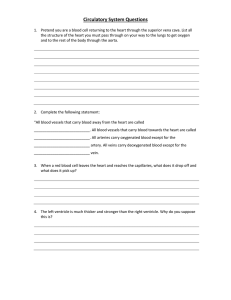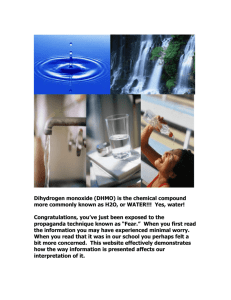Invensys Presentation (09-22-05)
advertisement
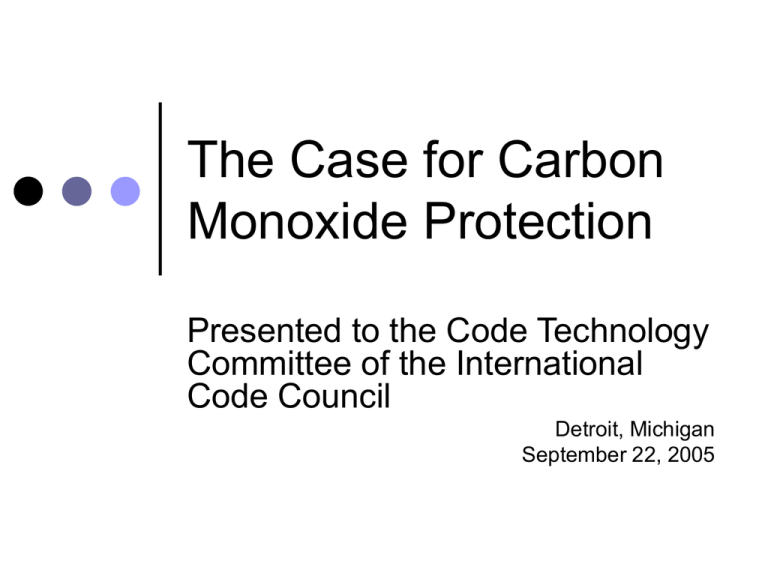
The Case for Carbon Monoxide Protection Presented to the Code Technology Committee of the International Code Council Detroit, Michigan September 22, 2005 Wendy Gifford Director, External Affairs, Invensys Vice Chair, National Electrical Manufacturers Association Carbon Monoxide Section Member, NFPA 720, Standard for the Installation of Household Carbon Monoxide Warning Equipment 2 Objective 3 To present the compelling evidence that will provide the Code Technology Committee the justification to mandate carbon monoxide protection in new and existing dwellings. Committee Draft Recommendation Not “sufficient justification” for mandating carbon monoxide protection. Death and injury data Cost/benefit calculation Detector/standard questions 4 Injuries are significant; Alarms offer effective solution Carbon monoxide poisoning causes 10,000 injuries a year. Long term consequences High societal costs. 5 Carbon monoxide alarms provide affordable, reliable protection appropriate to a building code. Carbon Monoxide Causes Many Injuries Carbon monoxide kills and injures more people than all other poisonings combined. 6 More than heroin One third may go undiagnosed “Significant under reporting of CO deaths.” “Misdiagnosis commonly occurs.” “Many non-lethal exposures go undetected” 7 Total injuries exceed 15,000; most in homes 2001-2003 data Centers for Disease Control Every year-- 15,200 people treated 480 deaths 8 Majority (64%) of non-fatal exposures occur in homes. CPSC: Nearly 200 died 2002: Estimated 188 carbon monoxide poisoning deaths associated with the use of a consumer product 9 Excludes those in which source is a vehicle, even if in home Decline in deaths may be artifact of statistics 10 “Part of the decrease from the 19941998 average annual estimate of 200 . . . To an average of 141 in 19992002 may be the result of . . . A new methodology.” Injuries vastly outnumber deaths For every residential carbon monoxide death, there may be 51 injuries. 9,728 annual injuries (CDC Data) 188 deaths (CPSC Data) 11 10,000 seek medical attention or miss work each year Even these numbers may be underreported Furnaces were the source in 46% of nonfatal CO poisonings Only 10% of fatal poisonings. “This suggests that the role of home heating appliances is prominent in the large group of underreported nonfatal exposures.” 12 CO poisoning affects the most vulnerable Death rate highest among 65+ Injury rate highest among children <4 The fetus is particularly vulnerable. Non-English speaking populations overrepresented 13 The effects are not always temporary or reversible Significant after effects Heart Brain 14 Carbon monoxide injuries can affect the heart. 15 Nearly 40% of patients with moderate to severe carbon monoxide (CO) poisoning will have cardiovascular manifestations. Neurological injuries can cause long term affects Delayed neurological dysfunction (brain damage) occurs in 14% to 40% of serious cases. Presents after patient appears “recovered” (2-40 days) Cognitive defects, memory impairment, learning Difficulty moving Personality changes 16 Can impact ability to work 17 One third of CO poisoning victims may have subtle but lasting memory deficits or personality changes. In a 3-year follow-up of 63 CO poisoning survivors, Smith and Brandon found that 33% showed evidence of personality deterioration and 43% reported memory impairment. Significant nerve damage can occur. Parkinson's Disease Persistent vegetative state Agnosia, Apraxia 18 inability to recognize and identify objects or people Voluntary movement impaired Nerve damage, continued. Mental deterioration, Urinary or fecal incontinence Gait disturbance 19 Visual impairment/Blindness Amnestic/confabulatory state Psychosis Hefty societal costs Lost work time, productivity Temporary Permanent Long term treatment 20 Health care costs CPSC estimates >$630 million societal costs annually Not having protection can be expensive legally CARBON MONOXIDE CASE SETTLED FOR $30 MILLION South Florida Sun-Sentinel; Fort Lauderdale, Fla.; May 26, 2001; Akilah Johnson Staff Writer Seven people who suffered brain damage after moving into or visiting the Terra Cotta Place Apartments will collect more than $30 million from complex owners and managers for failure to fix a water heater that was leaking carbon monoxide. 21 CO alarms are highly effective in reducing exposure. American Journal of Emergency Medicine study of 911 calls: “Persons with CO detectors were less likely to become symptomatic.” Only 13% symptomatic vs. 64% of those without alarms. 22 Mecklenburg County requires in all homes. Ice storm power outage: 161 people with confirmed CO exposure; 1 death 88% of the cases of symptomatic CO poisonings occurred in homes with no reported functioning CO alarm. Mecklenburg County changed ordinance to require battery back up; all homes 23 Alarms are already saving lives. Any discussion of a decline in death rates should consider growth in home carbon monoxide alarm use since 1994. 24 Estimates 25-35% household penetration. Current requirements States Cities & other AHJs 25 Alaska, Connecticut, New Jersey, New York, Rhode Island, Texas (group homes/day care), West Virginia, Utah, Vermont Chicago, New York City, and 30 others 26 Cost of compliance lower than assumed Significantly below committee estimate of $300-$500. Typically one per home 27 NFPA 720: One outside each separate sleeping area Smoke/CO combo units eliminate extra labor New construction (AC/DC): Existing homes (battery) 28 Combo alarm = $35-$52 Incremental = $15 over smoke alone No incremental labor Annual $6.15 (annual battery + 5 year life) CO alarm $20-$42 Annual $11.40 (annual battery + 5 year life) UL Testing confirms reliability Over five years, in home samples regularly tested to UL 2034 requirements in lab Alarms “have performed in an effective manor.” • 2 alarms alerted consumers to CO accumulations in homes • In lab checking, 1 late alarmed; 1 false positive. 29 CPSC Support CPSC goal: additional 20% reduction in deaths by 2013 CPSC continues to recommend CO alarms Tested alarms did not “expose consumers to a significant health risk” with one exception 30 Centers for Disease Control highlights the role of alarms “Yes, people can prevent carbon monoxide poisoning by taking some simple precautions, including making sure that: 31 “carbon monoxide detectors are properly installed and maintained in homes, houseboats, workplaces, and other appropriate places;” Standards development for CO alarms similar to smoke alarms ANSI UL 2034, carbon monoxide standard UL 217, smoke alarm standard 32 Three major changes in first 12 years of standard. Half a dozen changes in first 12 years after alarms were first required in residences. Meanwhile, lives were saved. Don’t wait for the “perfect” standard. CO protection is appropriate to a minimum standard UL 2034 life safety standard, not health standard 33 Allows levels far in excess of agency recommendations for outdoor air and the workplace. Comparative CO limits 34 Environmental Protection Agency Outdoor air: 9 ppm/8 hours; 35 ppm/1 hour ICC IMC Parking garage: 25 ppm/1 hour requires ventilation American Conference of Governmental Industrial Hygienists 25 ppm/8 hours National Institute for Occupational Safety and Health 35 ppm/8 hours Occupational Safety and Health Administration 50 ppm/8 hours UL 2034 = ignore 30 ppm/30 days; 70 ppm/1 hour 35 The least we can do is offer some protection in the home where the most vulnerable population spends the most time. Not for profit organizational support American Lung Association Home Safety Council National Safe Kids Campaign Residential Fire Safety Institute 36 Evidence is compelling. Residential carbon monoxide deaths and injuries are a major problem. Long term implications and societal costs are significant. We have the tool right now to protect lives. 37 Conclusion The Code Technology Committee has the opportunity to lead. We ask you to recommend carbon monoxide protection for dwelling units and start saving lives. 38 References 39 Choi, S. “Delayed neurologic sequelae in carbon monoxide intoxication,” JAMA Archives of Neurology, Vol 40, No 7, July 1983 Krenzelok, EP, “Carbon Monoxide, the silent killer with an audible solution,” American Journal of Emergency Medicine 14 (5): 484-486 SEP 1996 Lavonas, Ed., MD, et. Al, “Use of Carbon Monoxide Alarms to Prevent Poisonings During a Power Outage---North Carolina, December 2002”, Journal of the American Medical Association (2004;291:1691-1692) and MMWR (2004;53:189-192) Shochat, Guy, MD, Assistant Clinical Professor of Medicine, Division of Emergency Medicine, University of California at San Francisco Medical Center, and Lucchesi, Michael, MD, Chair, Associate Professor, Department of Emergency Medicine, State University of New York at Brooklyn, “Toxicity, Carbon Monoxide,” August 19, 2004, emedicine.com 40 Tomaszewski, Christian, MD, Carolinas Medical Center, Charlotte, North Carolina & Department of Emergency Medicine, University of North Carolina at Chapel Hill School of Medicine, “Carbon monoxide poisoning: Early awareness and intervention can save lives” Postgraduate Medicine, Vol 105, No 1, January 1999. Carbon monoxide poisoning; Early awareness and intervention can save lives. Christian Tomaszewski, MD, VOL 105 / NO 1 / JANUARY 1999 / POSTGRADUATE MEDICINE Varon J, Marik PE: Carbon Monoxide Poisoning. The Internet Journal of Emergency and Intensive Care Medicine 1997; Vol1 N2: http://www.ispub.com/journals/IJEICM/Vol1N2/CO.htm “Carbon Monoxide Poisoning Often Cardiotoxic” Reuters Health Information 2005. (Dr. Timothy Henry, Minneapolis Heart Institute Foundation study, reported in the Journal of the American College of Cardiology. “Unintentional Non—Fire-Related Carbon Monoxide Exposures – United Staes, 2001-2003,” Centers for Disease Control, MMWR Weekly, January 21, 2005 “Non-Fire Carbon Monoxide Deaths Associated with the Use of Consumer Products, 2002 Annual Estimates” consumer Product Safety Commission. “Carbon Monoxide Alarm Field Study,” December 2004, Underwriters Laboratories 41
